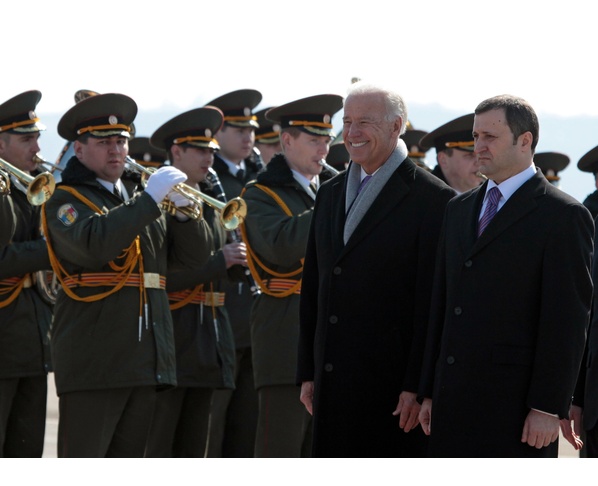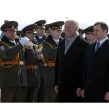
Vice-President Joe Biden Shows US Flag in Moldova (Part Two)
Publication: Eurasia Daily Monitor Volume: 8 Issue: 52
By:

The United States has taken a back seat to the European Union regarding Moldova since the final years of the Bush administration. This stance became inevitable due to US over commitments in debilitating conflicts on one hand, and the EU’s own initiatives in its immediate neighborhood on the other hand. Moreover, NATO is not an option for the constitutionally neutral Moldova, with Russian troops stationed unlawfully on its territory. The US position consists of supporting EU initiatives toward Moldova, as well as Moldovan reforms that would qualify the country for closer ties to the EU.
This was also US Vice-President Joseph Biden’s message in his March 11 visit to Chisinau (“Vice-President Biden’s Visit Can Reanimate US-Moldova Relations,” EDM, March 15). Moreover, Biden inevitably adjusted the US message to the new era of the US-Russia “reset.” In his private talks with Moldovan Prime Minister, Vlad Filat, and Parliamentary Chairman, Marian Lupu, the US Vice President made the following salient points:
1. The US is facing challenges on multiple fronts while “resetting” relations with Russia, while Russia is being “helpful” in regard to those challenges. The US will not quarrel with Russia for Moldova on the Transnistria conflict.
2. Washington supports the EU’s policy in the 5+2 negotiations on the Transnistria conflict, the immediate goal being to resume the negotiations [Moscow and Tiraspol are blocking those negotiations since March 2006]. The US also supports German Chancellor Angela Merkel’s initiative (June 2010 Meseberg Memorandum) to enlist Moscow’s cooperation on conflict-resolution in Transnistria, in return for creating an EU-Russia consultative body on European security [meanwhile, Berlin has not clarified what the trade-off would entail on either side].
3. Simply raising the issue of Russian troop withdrawal is not sufficient; specific remedies to the problem need to be adduced when Moldova raises it.
4. Conflict-resolution depends first and foremost on Moldova making itself attractive to left-bank Transnistria through internal reforms and Europeanization. “The right-bank grass must become greener than the left-bank grass” [Georgia, however, was receiving similar advice prior to 2008, and Georgia was delivering the reforms].
5. Moldova provides an example to other countries of the EU’s eastern neighborhood in terms of democratization and its will to reform. Moldova has the potential to become a “success story” of the EU’s Eastern Partnership program [with this, the US endorses the main thesis of EU supporters of finalizing an association agreement with Moldova].
6. To continue qualifying for US assistance, Moldova must (apart from institutional reforms) deal more effectively with human trafficking.
In those private talks, Prime Minister Filat and Foreign Minister, Iurie Leanca, did not fail to insist on the illegal nature of Russia’s military presence. Citing the “host-country-consent” and other principles of international law, the Moldovan officials asked for US support and urged the observance of these principles in any renegotiation on conventional arms control agreements in Europe.
In his joint news conference with Filat, and his speech to a 5,000 to 10,000 strong crowd in one of Chisinau’s squares, Biden added that the US supports Moldova’s territorial integrity, regards Transnistria as an integral part of Moldova, and wants a reunified Moldova to join Europe. He stopped short of mentioning the issue of Russian troops publicly. The US, he said, supports “not any kind of settlement, but one that preserves Moldova’s sovereignty and territorial integrity.” Whether and how this support advances from the verbal to the operational remains to be seen.
For his part, Filat defined Moldova’s goal as establishing a “privileged partnership” with the US, alongside integration with the EU. He expressed hope that Biden would use his influence in the US and internationally to help Moldova resolve the Transnistria conflict. “We hope that the US will stand by us until the successful resolution of the Transnistria conflict,” Filat declared, with Biden at his side (Moldpres, Moldovan TV Channel One, March 11; US White House transcript, released March 11).
In a post-visit commentary, Moldovan Foreign Minister Iurie Leanca interpreted Biden’s visit as confirming the obsolescence of the notion of spheres of influence in Europe’s East. In tune with Filat, Leanca also assessed Biden’s visit as “strong moral support” for Moldova’s governing Alliance for European Integration (AEI) (Interfax, March 14). However, as Chisinau’s leading pro-AEI (as well as critical of AEI’s internal rifts) newspaper editorialized (Timpul, March 14), the coalition’s parties need to close ranks among themselves in order to make more effective use of the Western support on offer to Moldova.




